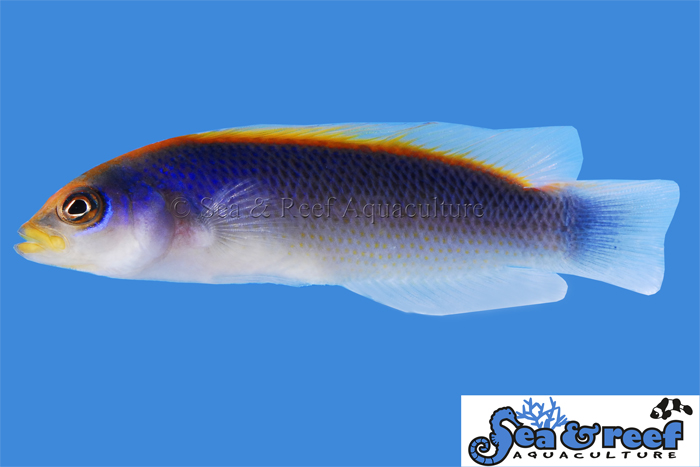The Sunrise Dottyback is a gem from the Red Sea. The body color is a deep sky blue with a yellow line that runs along the dorsal and ventral side of the fish all the way to the yellow tail. The eyes of the Sunrise Dottyback have a blend of blue and yellow coloration. Limited collection from the areas of origin makes it increasingly difficult to come by wild collected Sunrise Dottybacks. Fortunately, we have included this species in our breeding program and captive bred Sunrise Dottybacks are readily available from Sea & Reef Aquaculture. The Sunrise Dottyback is considered a moderately aggressive species. It is recommended to add single fish or a mated pair to a saltwater aquarium. Expect it to be shy at first and hide in the rockwork and crevices. However, it will quickly become bolder and spend more time in the open. It is possible to establish a pair if you select a large and a small fish. Dottybacks are protogynous hermaphrodites, which mean they are born female and can change sex to males. The larger fish will typically change sex and become a male and a pair is formed. It is the male’s job to guard the eggs and it is normal to not see him for days while he is performing this job. Males can become very territorial when guarding eggs and will chase the female away during this time. Therefore, it is important to provide plenty of hiding places in the rockwork where the female can seek shelter. Most dottybacks love meaty food items like Mysis shrimp, brine shrimp, krill, and various frozen meaty aquarium foods. However, they will also readily accept pellets and flake food. Sunrise Dottybacks will feast on bristle worms in your tank if they are present and it is not uncommon to see white bristle worm spines protrude from their faces. This does not seem to bother them and the spines will quickly disappear. Photo and text courtesy of Sea & Reef.

Sunrise Dottyback
Details
Scientific Name: Pseudochromis flavivertex
Family:
Color:
Fish Care
Fish Diet: Frozen or Prepared Food
Aggressiveness: Non-Aggressive
Reef Safe: Yes
Minimum Tank Size: 20g
Max Size:
Relative Care: Easy
